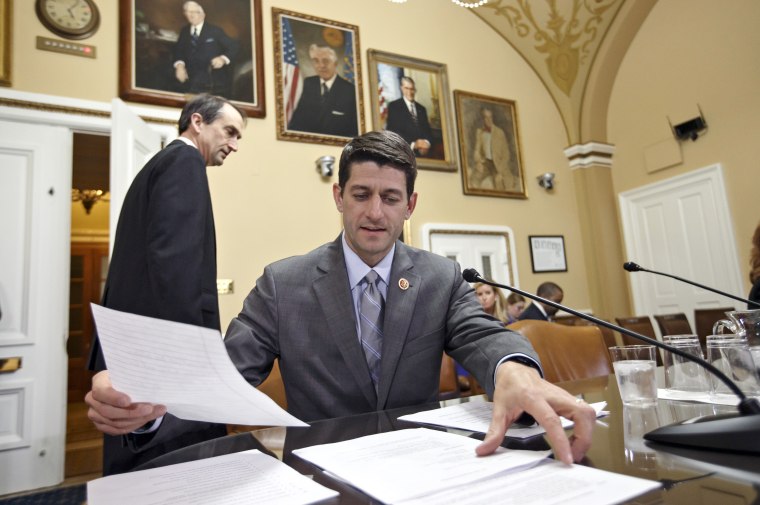House Budget Committee Chairman Paul Ryan (R-Wis.) turned to Twitter on Friday in the hopes of generating some support for his far-right budget plan. In the process, he pushed a very familiar line:
"Every family must balance its budget. Washington should too. Sign the petition to support a balanced budget."
Let's put aside for now the fact that Ryan's regressive budget plan doesn't actually balance in the way he claims. Let's instead focus on the first two-thirds of the congressman's message.
Long-time readers may recall that this is a frequent pet peeve of mine, but since we haven't covered it in a long while, let's review how very wrong Ryan is.
To be sure, I can appreciate the folksy appeal of the message -- the "every family must balance its budget" argument has a certain down-home, common-sense sort of quality to it. If American families and American businesses can't run massive deficits and borrow billions, the argument goes, why does the American government?
The point that generally gets lost is the detail that matters: families and businesses borrow money and run deficits all the time. Ryan may struggle with this, but it's a positive, not a negative, development.
When a family goes to buy a home, for example, its members don't simply write a check; they take out a mortgage. Almost no one can afford to literally buy a home outright, so Americans routinely take out very large loans, and make payments, with interest.
The same is true when a family wants a car, tackles college tuition, or thinks about starting a small business. American families, in other words, take on debts, some of them huge relative to their incomes, all the time. There's nothing wrong with any of this -- these are just routine examples of people investing in themselves, as they should.
Businesses to do this, too, borrowing money to make capital improvements, expand locations, buy smaller companies, etc. Companies generally create jobs this way, and do so with the blessing of investors.
The government's debts aren't identical, but policymakers take on debts to invest in things they consider worthwhile, too. A family that relies on student loans to pay for college should be able to relate to a government that relies on loans to pay for public services. The family thinks it'll be worth living in the red for a while, so long as it can make the payments and afford the interest, because they'll be better off in the long run -- and the government believes the exact same thing.
And they're both correct.
I should note that it's possible Ryan understands this and uses misleading rhetoric for political reasons. It's also possible Ryan's reputation as a wonk has been wildly exaggerated and he actually believes families never run deficits or borrow money.
Either way, however, the Wisconsin Republican wrong.
Indeed, maybe Ryan could answer a straightforward follow-up question: If Mr. and Ms. America take on debts they can afford to improve their position in life, why is it outrageous for their government to do the same thing?
The usual answer from the right is that our current debt is simply too large and we can no longer afford it. (They weren't thinking this way during the fiscally reckless Bush/Cheney era, but never mind that now.) But we can afford it; that's the point. Like a family making its monthly payments, the government is doing the same. We're doing so well on this front that others keep loaning us money at low interest rates, confident that we're good for it.
This seems like something the chairman of the House Budget Committee should understand.
